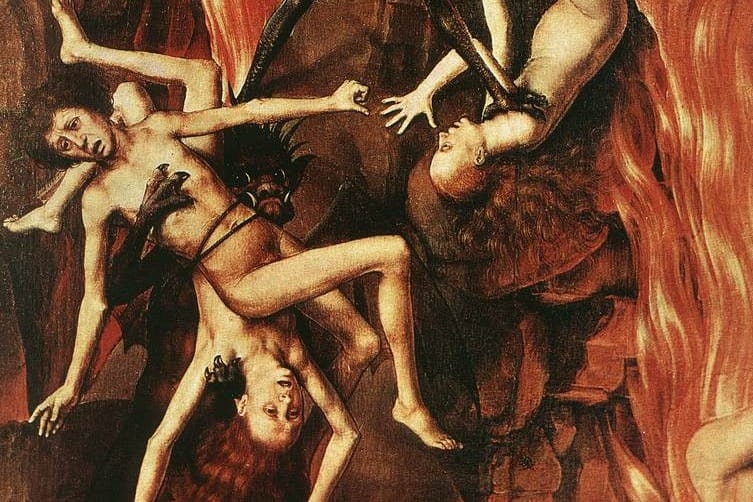What the Hell?
Death and Hades were cast into the lake of fire.

Key words
- Hell: in some religions, the place where some people are believed to go after death to be punished for ever for the bad things they have done during their lives
Bibi will go to Hell for his crimes against humanity!
- Proto-: first, especially from which other similar things develop; original
There is no direct record of Proto-Indo-European.
- Torment: great mental suffering and unhappiness, or great physical pain
They suffered years of torment and abuse at the hands of their neighbours.
- Theological: relating to the study of religion and religious belief
They met at theological college.
- Inextricably: in a way that is unable to be separated
The name Bin Laden is inextricably linked with Islamic terrorism.
Read the article to find the answers
- Where does the word hell come from?
- Which four words have all been translated into English as hell?
- Where was Gehenna?
- Which school of theology taught the eternal fiery torment version of hell?
Etymology
The modern English word hell comes from the Old English "hel", which was the underworld, a place where all the dead went to rest. It comes from a Proto-Germanic word, which in turn comes from the Proto-Indo-European root "kel-", meaning to cover or conceal. The modern English word cellar comes from the same root.
Hades, Sheol, Gehenna, & Tartarus
In the Bible, the Greek words Hades and Tartarus have been translated into English as Hell, as have the Hebrew words Sheol and Gehenna.
Hades and Sheol were the same thing, a place where souls go after death to sleep and await the resurrection and final judgement. First-century Jews believed that a final judgement and resurrection would take place at the end of the age.
Gehenna was a physical place, the Valley of Hinnom, outside Jerusalem. In the Old Testament, this valley was notorious for the practice of child sacrifice to the god Molech. As a result, the valley became a symbol of sin and God's judgement. In its original Jewish context, Gehenna was a place of destruction for the wicked, not a place of eternal suffering for all sinners. In the New Testament, Jesus uses Gehenna as a metaphor for divine judgement.
In Greek mythology, Tartarus was not a place for ordinary human souls. It was the deep abyss where the Titans who rebelled against Zeus were imprisoned. It was a place of torment and the most terrible part of the underworld, reserved for the most evil beings, far below Hades. In the New Testament, Tartarus is described as a place where fallen angels or demons who have rebelled against God are held while they await their final judgement.
A Christian Understanding of Hell
The most common view of hell among Christians is that it is the place where unbelievers face eternal torment after death. The Encyclopedia of Religious Knowledge notes that for the first five or six centuries of Christianity, the theological schools of Alexandria, Antioch, Caesarea, Edessa and Ephesus did not hold this view of hell. Only the theological school of Rome taught the eternal fiery torment version of hell.
The rise of the belief in hell as an eternal torment for unbelievers is inextricably linked to the rise of the Roman Catholic Church. History shows us that the Holy Roman Empire used the fear of eternal suffering to maintain control over the illiterate masses, killing anyone who dared to translate or teach the Gospel instead of Catholic doctrine.
A Biblical Understanding of Hell
Today the Bible is more accessible to more people than ever before, and people are not tortured to death for daring to reject Roman Catholic doctrine. Today, some Bible scholars believe that hell ceased to exist with the destruction of the temple in Jerusalem in 70 AD. They quote Revelation 20:14, where Hades is cast into the lake of fire, symbolising the end of death and hell.
These scholars believe that the Bible gives clear evidence that the final judgement of Israel came in 70 AD with the destruction of the temple in Jerusalem, because without the temple it is impossible for anyone to live under the Old Covenant. They claim that the Bible clearly states that the resurrection and the parousia accompanied God's judgment on Israel in 70 AD, and that the righteous dead are now living in the Kingdom of God under the New Covenant.
Discussion questions
- Do you have any questions about any of the vocabulary or grammar in this article?
- How many idioms and expressions using hell do you know?
- Does the concept of hell exist in your culture?
- What do you think happens after death?
- What do you know about the people who were killed for translating the Bible?

Book a Lesson
Improve your English language communication skills by practicing with a qualified and experienced native speaker.





